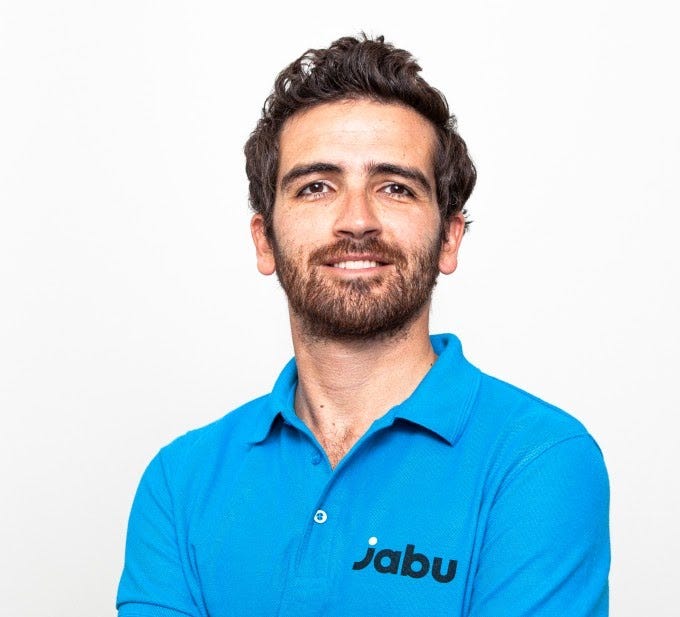JABU, a Namibian business-to-business e-commerce startup, has raised $3.2 million in a funding round. Afore Capital, Y Combinator, FJ Labs, Quiet Capital, Kli Capital, Pareto Capital, and unknown angels participated in the seed round, which completed last year.
“We went into the informal sector and realized that the city had shut down every single informal retailer. And when they did that, we had this software we had developed to like digitize housing demand,” co-founder and CEO David Akinin who started JABU after his construction company went on a COVID relief program to donate food supplies in Namibia, said.
“We hired 40 people from the community and in about one or two weeks, we registered 1,000 shops that had been affected by this shutdown. We realized that there’s a huge opportunity here to not only help them reopen but understand something very key here that they have no supply chain and also no way of sourcing their products at an affordable rate.”
The seed financing and future expansion round will be used to expand into Botswana and South Africa, build the tech and operations team, and train the startup’s field agents.

Why The Investors Invested
Although founded in mid-2020, the startup has generated considerable traction. It currently connects over 6,000 retailers to local and multinational suppliers — including Namibia Breweries Limited, ABInBev, Bokomo, Coca-Cola, Namibmills — and digitizes orders, payments and logistics. Also, the company is currently active in three Namibian cities and has just expanded into two Zambian cities. Since March, its monthly GMV has increased by 25 times, and the average monthly growth of delivered SKUs has been about 53 percent. Revenue has increased 35 times in the same time period, according to the startup.
Read also Inside The Mind Of Africa’s First Female-led Fintech Unicorn, Wave
The startup has also added a fintech feature — a wallet system for its merchants— that has helped it to grow.
“Our volumes growth grew so much and we’ve picked up so much money in physical currency, the banks and others have sat down and said, ‘How can we fix this?’ I mean, we went from having a couple R100,000 (rands) a week to having millions of Namibian dollars. And we realized there’s something better and bigger than we originally tapped into,” Akinin said on why the company is adding wallets for its merchants.
Also convincing investors in this round is the fact that JABU is part of last year’s Y Combinator’s summer accelerator programme, making it the first Namibian startup to join the prestigious American accelerator.
The startup team also played a crucial role in the latest fundraising. Akinin, who worked as a sales and goods analyst at Google, also worked as an investment banker at Credit Suisse for portion of his career. He would go on to visit prominent African cities such as Johannesburg, Lagos, and Addis Ababa in the future, but it was in Windhoek that he got the idea to attempt something different.
Read also Elevating Digital Payments For a Cashless Future in Africa
Afore Capital is a San Francisco-based venture capital firm that focuses solely on pre-seed stage companies.
FJ Labs is a stage-agnostic investment firm based in New York that focuses on marketplaces and consumer-facing entrepreneurs. Also based in New York is Kli Capital which is a private investment fund focused on investing in and supporting ambitious founders.
San Francisco-based Quiet Capital invests in technology businesses early to build long-term value.
A Look At What JABU Does
As a last-mile distribution e-commerce business, JABU was founded in mid-2020 by CEO David Akinin to improve Namibia’s inefficient and nearly non-existent supply chain and distribution.
The Namibian startup has eight distribution facilities and a fleet of cars. Suppliers can use dashboards to see where their products are being delivered, verify critical performance indicators, and schedule merchandising. They can also run advertising and marketing campaigns in stores, give away products, and profit from merchandising.
Read also South Africa, Nigeria and Namibia Leads Global Unemployment Rates
Namibia, like most African countries, is heavily reliant on cash. And, because it owns its supply chain, JABU is attempting to digitize its physical cash collection procedures using wallets.
When money from retailers arrives at JABU distribution hubs, it usually takes 48 hours for it to be deposited into banks. JABU’s wallets will allow businesses to deposit and withdraw money instantly in sync with these centers, eliminating the need to go through this tedious process.
According to Akinin, the next stage of JABU’s wallet system would see businesses offering users other services in addition to their digitized cash.
“The only way to do that is by partnering with the merchants, and they go through a [know your customer] process, we make sure the merchants have the right space and the right account to back their float. And then they transact with their customers. So we’re entering the B2B2C space through the merchants that we work with,” he said.
The majority of JABU’s revenue comes from self-distribution or third-party fleets. Merchandising, as well as targeted marketing and advertising, help the company make money. In the future, it will take commissions from transactions made through merchant wallets.
Read also Africa’s Transporters Adopt Cellulant’s Technology in Bid to Digitize the Sector
According to Akinin, the company presently employs over 200 employees.
Namibian JABU Namibian JABU
